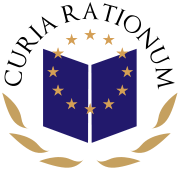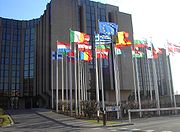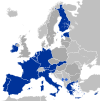- Court of Auditors
-
Court of Auditors 
Official emblem 
Premises in Luxembourg Institutional overview Formed 1975 Jurisdiction European Union Headquarters Luxembourg, Luxembourg
49°37′22″N 6°8′49″E / 49.62278°N 6.14694°EInstitutional executive Vítor Manuel da Silva Caldeira, President Website eca.europa.eu The Court of Auditors is the fifth institution of the European Union (EU). It was established in 1975 in Luxembourg to audit the accounts of EU institutions. The Court is composed of one member from each EU member state and its current president (as of 2008) is Vítor Manuel da Silva Caldeira.[1]
Contents
History
European Union 
This article is part of the series:
Politics and government of
the European UnionPolicies and issuesMain article: History of the European UnionThe Court of Auditors was created by the 1975 Budgetary Treaty and was formally established on 18 October 1977, holding its first session a week later. At that time the Court was not a formal institution, it was an external body designed to audit the finances of the European Communities. It replaced two separate audit bodies, one which dealt with the finances of the European Economic Community and Euratom and one which dealt with the European Coal and Steel Community.[2]
The Court did not have a defined legal status until the Treaty of Maastricht when it was made the fifth institution, the first new institution since the founding of the Community. By becoming an institution it gained some new powers, such as the ability to bring actions before the European Court of Justice (ECJ). However its audit power related only to the European Community pillar of the EU, but under the Treaty of Amsterdam it gained the full power to audit finances of the whole of the EU.[2]
Functions
Despite its name, the Court has no judicial functions. It is rather a professional external investigatory audit agency.[3] The primary role of the court is to externally check if the budget of the European Union has been implemented correctly, in that EU funds have been spent legally and with sound management. In doing so, the court checks the paperwork of all persons handling any income or expenditure of the Union and carries out spot checks. The court is bound to report any problems in the Court's reports for the attention of other states and institutions, these reports include its general annual report as well as specific and special reports on certain bodies and issues.[1][4] The Court's decision is the basis for the European Commission decisions, for example: when the Court found problems in the management of EU funds in the regions of England, the Commission suspended funds to those regions and prepared to fine those who did not come back up to acceptable standards.[5]
In this role the Court has to remain independent yet remain in touch with the other institutions, for example a key role is the presentation of the Court's annual report to the European Parliament. It is based on this report that the Parliament makes its decision on whether or not to sign off the European Commission's handling of the budget for that year.[1] The Parliament notably refused to do this in 1984 and 1999, the latter case forced the resignation of the Santer Commission.[6] The Court, if satisfied, also sends assurances to the Council and Parliament that the taxpayers money is being properly used[1] and the Court must be consulted before the adoption of any legislation with financial implications but the opinion is never binding.[4]
Organisation
The Court is composed of one member from each EU state who are appointed by the Council of the European Union for a renewable term of six years.[1] They are not all replaced every six years, however, as their terms do not coincide (four of the original members began with reduced terms of four years for this reason). Members are chosen from people who have served in national audit bodies, who are qualified for the office and whose independence is beyond doubt. While serving in the Court, members cannot engage in any other professional activities.[7] As the body is independent, its members are free to decide their own organisation and rules of procedure, although these must be ratified by the Council of the European Union.[8] Since the Treaty of Nice, the Court can set up "chambers" (with only a few Members each) to adopt certain types of reports or opinions.[9]
The Court is supported by a staff of approximately 800 auditors, translators and administrators. Auditors are divided into auditor groups which inspect and prepare draft reports for the Court to take decisions upon. Inspections take place not only of EU institutions but any state which receives EU funds given that 90% of income and expenditure is managed by national authorities rather than the EU. Upon finding a fault the Court has no legal powers of its own and instead informs OLAF which is the EU's anti-fraud agency.[1] The court is also assisted by the Secretary-General of the European Court of Auditors, elected by the court, who draws up draft minutes and keeps archives of decisions as well as ensures the publication of reports in the Official Journal of the European Union along with general management and assistance to the President.[10]
President
The members then elect one of their members as the President of the Court for a renewable three year term. The election takes place by a secret ballot of those members who applied for the presidency. The duties of the President (which may be delegated) are to convene and chair the meetings of the Court, ensuring that decisions are implemented and the departments (and other activities) are soundly managed. The president also represents the court and appoints a representative for it in contentious proceedings.[10]
At present the President is Vítor Manuel da Silva Caldeira (of Portugal), elected in 2007.[1] Previous presidents have been Sir Norman Price (1977, United Kingdom), Michael Murphy (1977, Ireland), Pierre Lelong (1981, France), Marcel Mart (1984, Luxembourg), Aldo Angioi (1990, Italy), André Middlehoek (1992, Netherlands), Bernhard Friedmann (1996, Germany), Jan O. Karlsson (1999, Sweden), Juan Manuel Fabra Vallés (2002, Spain) and Hubert Weber (2006, Austria).[11]
Criticism
Declaration of Assurance
Since 1994 the Court has been required to provide a "Declaration of Assurance", essentially a certificate that an entire annual budget can be accounted for. This has proved to be a problem, as even relatively minor omissions require the Court to refuse a declaration of assurance for the entire budget, even if almost all of the budget is considered reliable.[citation needed]
This has led to media reports of the EU accounts being "riddled with fraud", where issues are based on errors in paperwork even though the underlying spending was legal.[citation needed] The auditing system itself has drawn criticism from this perception. The Commission in particular have stated that the bar is too high, and that only 0.09% of the budget is subject to fraud.[12] The Commission has elsewhere stated that it is important to distinguish between fraud and other irregularities.[13] The controversial dismissal in 2003 of Marta Andreasen for her criticism of procedures in 2002 has called into doubt the integrity of the institutions.
It is frequently claimed that annual accounts have not been certified by the external auditor since 1994. In its annual report on the implementation of the 2009 EU Budget, the Court of Auditors found that the two biggest areas of the EU budget, agriculture and regional spending, have not been signed off on and remain "materially affected by error."[14]
Terry Wynn MEP who served on the Parliament's Committee on Budgetary Control, reaching the position of chairman, has also backed these calls stating that it is impossible for the Commission to achieve these standards. In a report entitled 'EU Budget – Public Perception & Fact – how much does it cost, where does the money go and why is it criticised so much?', Wynn cites consensus that practice in the EU differs from that in the US. In the US, the focus is on the financial information, not on the legality and regularity of the underlying transactions, 'So, other than in Europe, the political reaction in the US to the failure to obtain a clean audit opinion is only "a big yawn"'.[15]
By comparison, the Auditor General for the United Kingdom stated that there were 500 separate accounts for the UK and "in the last year, I qualified 13 of the 500. If I had to operate the EU system, then, because I qualify 13 accounts, I might have to qualify the whole British central government expenditure". Despite the problems, the Barroso Commission has stated that it aims to bring the budget within the Court's limits by the end of its mandate in 2009.[12]
The ECA made clear in their 2010 year report, “Responsibility for the legality and regularity of spending on Cohesion Policies starts in the Member States, but the Commission bears the ultimate responsibility for the correct implementation of the budget.” And in previous reports, the ECA has noted, "Regardless of the method of implementation applied, the Commission bears the ultimate responsibility for the legality and regularity of the transactions underlying the accounts of the European Communities (Article 274 of the Treaty)."[14]
Size
The size of the court has also come under criticism. Based on the one member per state system its members grew from nine to twenty-seven as of 2007. Attempting to get consensus in the body has thus become more difficult leading to the number of its special reports per year shrinking from fifteen to six between 2003 and 2005 despite its staff growing by 200 over the same period. Some proposals have been for the size to be reduced to five members or just one, possibly with an advisory board with members from each member state. However, neither the European Constitution nor the Lisbon Treaty proposed any changes to this system despite calls to address it by former court members and MEPs.[3][16]
See also
References
- ^ a b c d e f g "Institutions of the EU: The European Court of Auditors". Europa (web portal). http://europa.eu/institutions/inst/auditors/index_en.htm. Retrieved 15 October 2007.
- ^ a b "European Court of Auditors". European NAvigator. http://www.ena.lu?lang=2&doc=6548. Retrieved 15 October 2007.
- ^ a b Bösch, Herbert (18 October 2007). "Speech by Herbert Bösch, Chairman of the European Parliament's Committee on Budgetary Control". Europa (web portal). http://europa.eu/rapid/pressReleasesAction.do?reference=ECA/07/21&format=PDF&aged=0&language=EN&guiLanguage=en. Retrieved 17 October 2007.
- ^ a b "Power of audit of the European Court of Auditors". European NAvigator. http://www.ena.lu?lang=2&doc=6557. Retrieved 15 October 2007.
- ^ "EU may force region to repay cash". BBC News. 16 October 2007. http://news.bbc.co.uk/2/hi/programmes/file_on_4/7045159.stm. Retrieved 17 October 2007.
- ^ "Budgetary control: 1996 discharge raises issue of confidence in the Commission". Europa (web portal). 1999. http://www.europarl.europa.eu/election/bilan/en/pf1901en.htm. Retrieved 15 October 2007.
- ^ "Composition of the European Court of Auditors". European NAvigator. http://www.ena.lu?lang=2&doc=6549. Retrieved 15 October 2007.
- ^ "Organisation and operation of the European Court of Auditors". European NAvigator. http://www.ena.lu?lang=2&doc=6550. Retrieved 15 October 2007.
- ^ "Glossary: The European Court of Auditors". Europa (web portal). http://europa.eu/scadplus/glossary/european_court_auditors_en.htm. Retrieved 15 October 2007.
- ^ a b "Organisation of the European Court of Auditors". European NAvigator. http://www.ena.lu?lang=2&doc=6552. Retrieved 15 October 2007.
- ^ "Presidents of the European Court of Auditors". European NAvigator. http://www.ena.lu?lang=2&doc=10742. Retrieved 15 October 2007.
- ^ a b Mulvey, Stephen (24 October 2006). "Why the EU's audit is bad news". BBC News. http://news.bbc.co.uk/1/hi/world/europe/6078982.stm. Retrieved 15 October 2007.
- ^ "Protection of the European Union's financial interests – Fight against fraud – Annual Report 2009 (vid. p. 5)". Europa. http://ec.europa.eu/anti_fraud/reports/commission/2009/en.pdf. Retrieved 22 December 2010.
- ^ a b "OpenEurope". OpenEurope. http://www.openeurope.org.uk/media-centre/pressrelease.aspx?pressreleaseid=150. Retrieved 14 September 2011.
- ^ "EU Budget – Public Perception & Fact (vid. II.1.2; Conclusion)". Terry Wynn. http://www.terrywynn.com/Budget/EU%20Budget%20-%20Perception%20&%20Fact.htm. Retrieved 22 December 2010.
- ^ Karlsson, Jan; Tobisson, Lars. "‘Much talk, little action’ at European Court of Auditors". European Voice. http://www.europeanvoice.com/archive/article.asp?id=28233. Retrieved 15 October 2007.
External links
Categories:- European Court of Auditors
- European Union law
- International courts and tribunals
- Political corruption
- Government audit
- Organisations based in Luxembourg City
Wikimedia Foundation. 2010.






